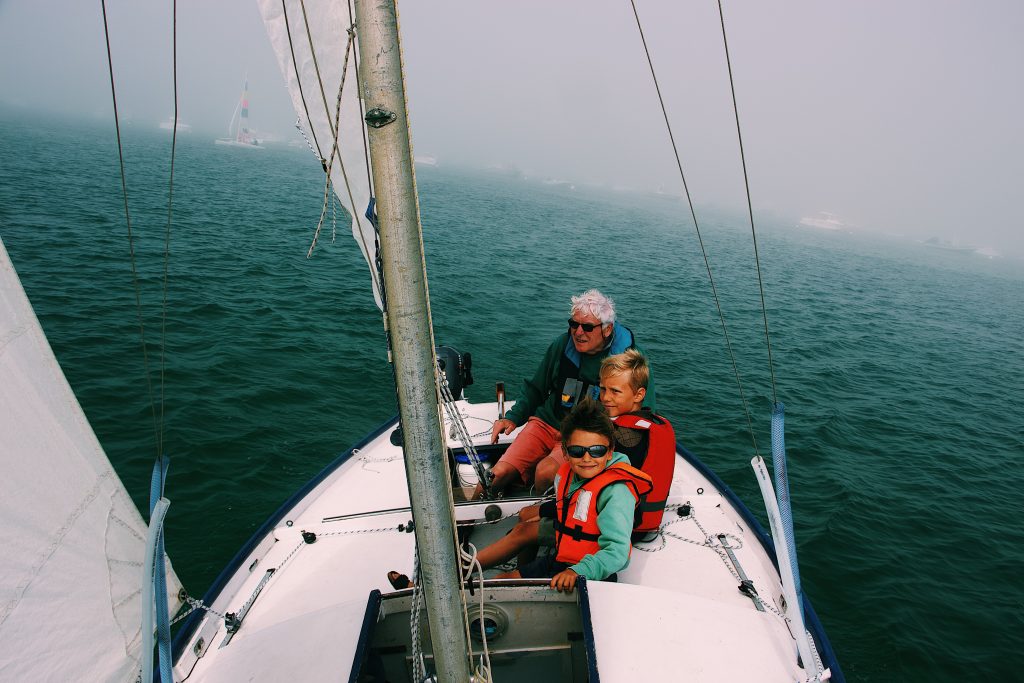When you’re afraid to get in the boat, who soothes your fear?

The boat launch was busy, so I sat on a park bench a short distance away instead of my favourite spot near the end of the dock. In the parking lot behind me, a small boy in a life jacket was flailing and screaming “I DON’T WANT TO GO!” His dad was trying everything he could to coax, cajole, or convince the boy to head down to the dock to get in the boat with his grandpa. Nothing seemed to be working, so he finally threw the boy over his shoulder and walked down to the dock, with that familiar clenched-jaw-look that every parent knows.
I couldn’t see the dock from my vantage point higher up on the riverbank and couldn’t hear the entire conversation. I just know that at first the boy continued to scream “I DON’T WANT TO GO!”, then he was silent for a while, and finally he was happily chatting in the boat as it set off onto the water.
Here’s what I imagine happened (based on my own experience, back when my children were small and had grandparents) … Once they got down to the dock, Grandpa worked some form of grandparent magic and was able to soothe the boy’s fear or resistance enough to convince him that he really DID want to go fishing with his dad and grandfather. Perhaps he distracted him with his new fishing pole or lure. Or maybe he made funny faces at him to make him laugh. Or maybe he listened to his fears and helped him see that he had the skills to overcome them. Or maybe he just talked to him in that soothing voice that seems to come easier for grandparents than parents.
Grandpa had a unique advantage at this moment, which is why I’m guessing he was the one to turn things around. He was arms-distance removed from the boy and the situation, yet still in a loving relationship with him. He likely hadn’t spent the morning listening to the boy. He didn’t have to get him out of bed and dressed for the day. He didn’t have to listen to the boy’s whining over the fact that they’d run out of his favourite cereal, or his over-exuberance over the upcoming boat adventure, while trying to pack the lunch for the boat trip, get the dishes done, and/or look after the boy’s baby sister. He didn’t have to clean up the spills, make the beds, or finish off the work project so he could take the rest of the day off with his son and dad.
Grandpa could step in with a fresh voice and fresh love, without any of the baggage leading up to that moment. He loved the boy but had less at stake in the boy’s tantrum because he didn’t have to go home with him afterwards or worry about whether he was making parenting mistakes that would result in long-term emotional baggage.
Everybody needs a grandpa (or a grandpa-substitute). Whether you’re a little boy who’s scared to get into the boat, or a grown-up who’s scared to mess up at a new job, or a teenager who’s scared to sign up for musical theater, you need people who love you but are sufficiently at arm’s length that they are not directly impacted by whatever crisis you’re in. You need people who are objective and compassionate and good at witnessing your fear without judging it or gaslighting you for it. You need people who can hold space for you.
One of the questions I am most frequently asked when I teach workshops on holding space is “Why is it so hard to hold space for the people I love the most?” My answer is usually some version of “the closer you are to the situation and the more you’ll be impacted by the outcome, the less you’re able to be an objective observer who can hold space without judgement or the need for control.”
The dad at the dock was directly impacted by the boy’s resistance (he would have likely missed out on his own chance to spend the day fishing with his dad if they couldn’t get the child in the boat) and therefore his emotions were probably closer to the surface. He wasn’t able to soothe himself enough to effectively hold space for whatever emotions his son needed to process because he had a bias – his own desire to get in the boat and (likely) a desire to not raise a child prone to temper tantrums.
Grandpa, on the other hand, was less directly impacted and probably didn’t have as much bias. And yet, he still had enough love for the boy to support him in the way he needed to be supported.
This is why we need different sorts of relationships and why we need to value people at all levels of intimacy, trust and shared experience. It’s also why we shouldn’t always assume that those closest to us have the capacity to soothe us when we’re upset or listen to us when we need to rant (nor should we always take on that burden in their lives, especially when we can’t be objective).
****
Want to learn more about how to hold space for others and how to ask others to hold space for you? Join us for the Holding Space Foundation Program. Or pick up a copy of The Art of Holding Space: A Practice of Love, Liberation, and Leadership.
